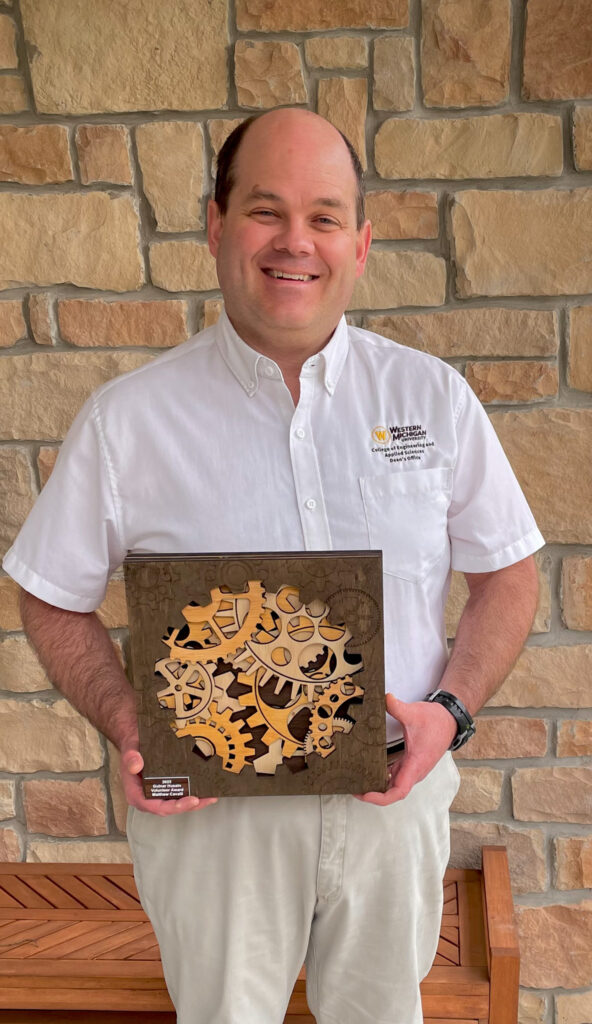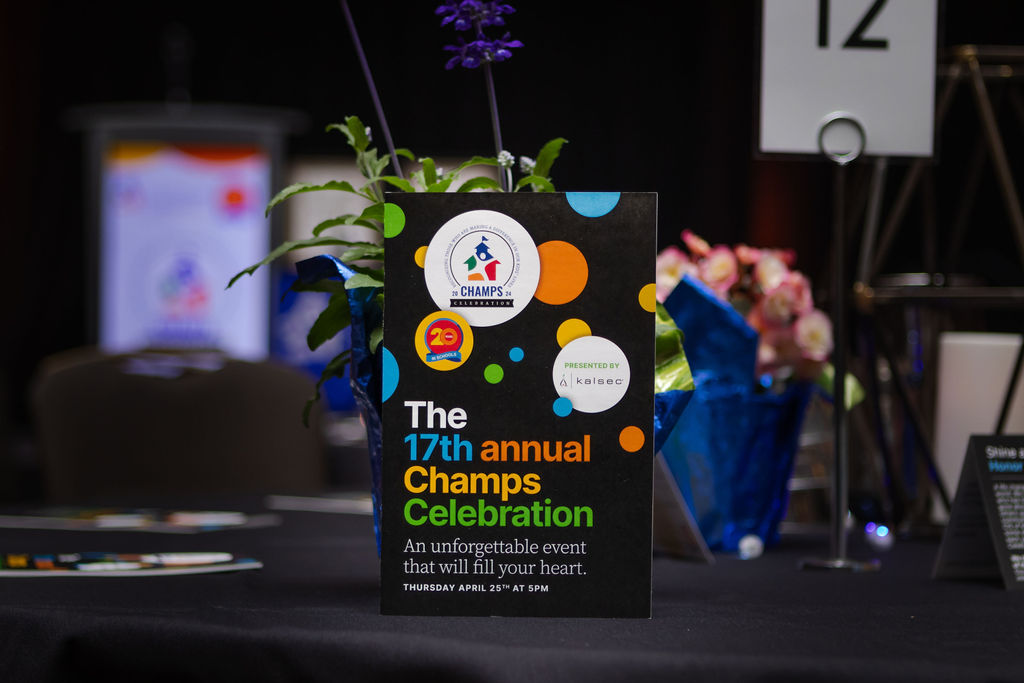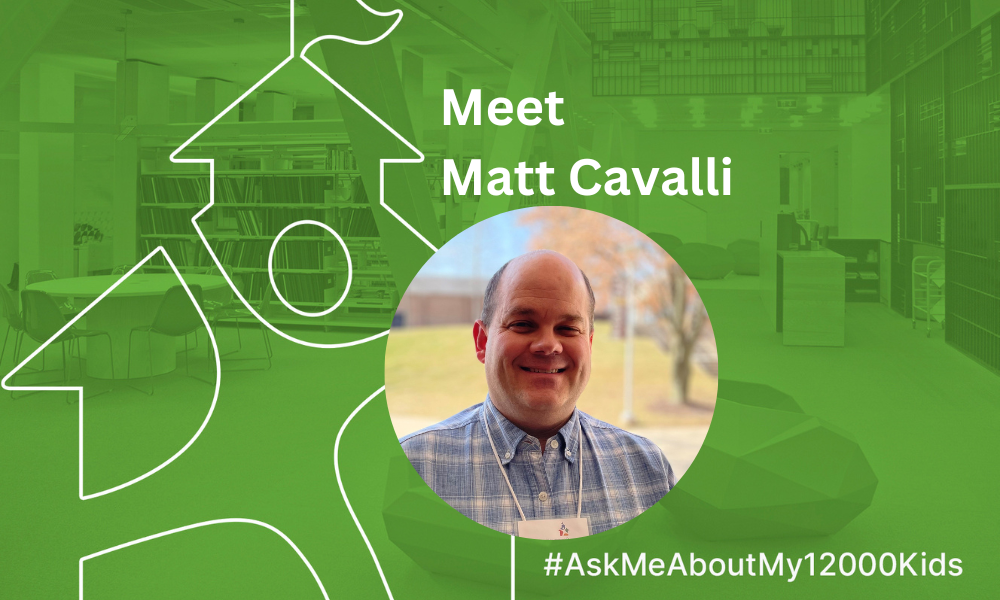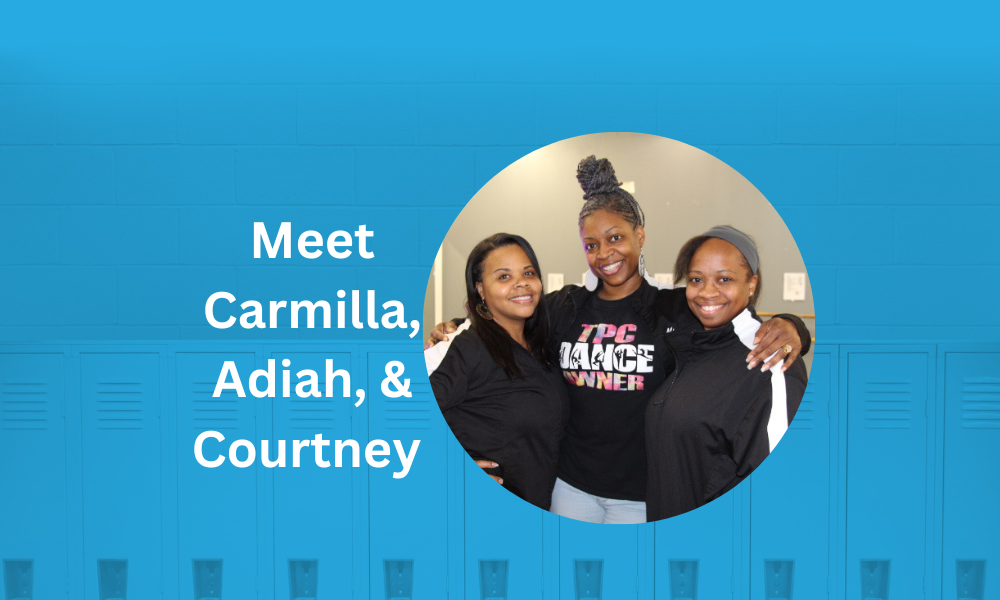Meet Matthew Cavalli: 2023 Gulnar Husain Volunteer Award Winner
Welcome back to the POP QUIZ! This is a regular, yet totally unexpected, feature where we ask students, parents, staff, our friends, and partners to answer a few questions about what they are learning, reading, and thinking about. Today we feature CIS volunteer Matthew Cavalli who was recently honored with the 2023 Gulnar Husain Volunteer Award. [You can watch a short clip of this year’s Champ event here. To learn more about Gulnar, read this post, “A Good Life.”]

For the past five years, this Professor and Associate Dean for Undergraduate Academic Affairs in the College of Engineering and Applied Sciences at Western Michigan University has been volunteering through CIS to help students at both Kalamazoo Central High School and Loy Norrix hone their math skills.
Born and raised in the state of Wyoming, Matt attended the University of Wyoming and then pursued his M.S. and Ph.D. in mechanical engineering from the University of Michigan. Prior to moving to the Kalamazoo area in 2018, Matt had been a professor and associate dean at the University of North Dakota.
Kalamazoo Central’s CIS Site Coordinator Emily Ayers says that, as a result of the pandemic, a number of students are behind in core subject areas, especially math. “Matt’s consistency, knowledge, and skill with teaching is an invaluable resource for our school,” she says. “Kalamazoo Central is very thankful that he takes time out of his day every week to support our students!”
Alright, Matt: pencil out, eyes on your own paper. Good luck.
Pop Quiz
What made you decide to start volunteering with CIS?
As part of my role as associate dean, I oversee our advising office as well as some of our first-year programs in the college. One of the unique things about the College of Engineering and Applied Sciences at Western is that students that wouldn’t normally be admitted to an engineering college—particularly those who are placing at a lower math level—may be admitted and have the opportunity to pursue an engineering degree that they may not get elsewhere.
One of the things I did when I got here [in the fall of 2018] was take a look at where a lot of those students who wanted to be engineers—but were coming in at the lower end of the math spectrum—where they were coming from, and a high proportion were coming from Kalamazoo county area, fairly local. And so, having done some volunteering in the past, at both UW and UM, I did an online search to see what organizations I could get involved with to help anyway I could, and I found CIS. That’s how it all started.
So glad you found us! It sounds like you are really helping kids to be math-ready when it comes time for college and career.
That’s what I’m trying to do. Helping students be more prepared and have those math tools they need so they have opportunities to pursue careers in engineering and the sciences if they want to. The sooner they get into the math mindset, the better off they are.
You volunteer about 14 hours a month doing individual and “push in” tutoring at both Loy Norrix High School and Kalamazoo Central High School. Can you describe for us what that volunteer work looks like?
In the past, I’ve typically volunteered at one school or the other. This year, I have been doing both. At Kalamazoo Central, I’ll go once a week and meet with a student after school, going through whatever homework assignment they might have, we’ll work through problems and talk about the theory, trying to make sure they can do not just those math problems, but that they also understand the concepts and can do the work themselves.
At Loy Norrix, last trimester I was in a traditional classroom at the algebra level. The students would break into groups and I’d spend the session with a small group on their in-class assignments or homework. This trimester, I’m in a different class, one that is considered a “Grad Point” class and is for students who have failed previous math classes. This class is a makeup opportunity for them.
You continued to volunteer with CIS throughout Covid, but it looked quite different, didn’t it? What was it like to volunteer during a time when students where learning virtually?
It was definitely challenging. The times that I was able to connect with students, well, other things were often going on in the background—whether it was siblings, parents, and things like that. So, it was hard for students to focus in on whatever we were trying to talk about that day.
It really helped drive home some of the challenges our kids face. You hear in the media the challenges out there, but that experience really showed me what that it looked like from the students’ point of view. I’m trying to get them to do math and they are worried about what they are going to have to eat or where they are going to sleep that night or whatever is going on at that particular moment. While it could be disheartening at moments, I was really pleased when students could stick it out and made some real progress.
Besides all the volunteer work you do with CIS, are you giving your time and talents elsewhere?
I have three children. My daughter is studying mechanical engineering. She decided she didn’t want me as an instructor, so she is pursuing her degree at the University of Michigan. And I have a son in middle school at Portage West and another son at Portage Northern High School. As they are both in the drama programs there, and I enjoy carpentry and handiwork type stuff, I have been helping to build sets this year. I am also one of the coaches for my youngest son’s soccer team with the Portage Soccer Club.
Where does your passion for volunteering come from?
I’m not sure. My mother was an elementary school teacher and I think I got the teaching bug from her. My father was a civil engineer and so I’m some kind of blend of the two of them.
When I was in college, starting in my undergraduate years, some of the programs provided opportunities for volunteering, whether it was peer tutoring or mentoring. That was my first foray into volunteering. It evolved into “official” volunteering, and I just have kept it up.
What is it like working with the CIS Site Teams at the high schools?
It is so helpful to have an intermediary, someone who can come between me and the teachers and support us both. I can’t imagine how difficult it is to balance teachers and volunteers, while navigating teachers’ and students’ needs. Coming to Kalamazoo and not having relationships within the schools, well, CIS has been a great resource in helping to make those connections. Site coordinators are so helpful and responsive.
What are you currently reading?
I just got an ebook, a Steven King novel called Later. I’m currently reading some short stories called Cursed edited by Marie O’Regan and Paul Kane. And I’m listening to Harrow the Ninth written by the New Zealand author Tamsyn Muir. It’s the second book in the fantasy series.
What is a question you recently asked or perhaps have been asking a lot lately?
I ask my kids to put their dishes away in the dishwasher. I don’t know if that counts.
It definitely does.
In your role as Associate Dean, you work with faculty and staff throughout the College and across campus to maximize the success of Western students. What is one or two strategies you are learning that works when it comes to helping students succeed? And do you think that this approach translates to high school students?
There are a number of things that have been identified as what we call “high impact practices” in the university setting. That would be things like getting students doing undergraduate research, studying abroad, engaging in active learning, doing co-ops and internships. These approaches go beyond students sitting in a classroom and being talked at in terms of learning new material.
We also know that helping people make a strong, personal connection with a faculty or staff member at the university is really critical to determining whether they stick around. There are a number of models out there that try to calculate the chance of someone being retained or not being retained.
I think the best approach that I’ve seen is that you need to approach the situation as if every student has the possibility of not being retained. Every one of us has some sort of risk factor or something that can trip us up and send us off the rails. The trick is finding the time and finding those connection points to have those relationships with students, to understand what those potential problems or redlines are, for a given student. It’s hard because this approach takes a lot of time. But the more personal connections we can facilitate, the greater the buy-in from students and the more investment they will make in the learning process. That translates at all levels.
That reminds me of a saying we have at CIS: “Programs don’t change kids. Relationships do.” At the high school level, if kids feel cared for by someone, an adult in the school, they are more likely to stay in school and graduate. Relationships are definitely key at all levels.
What is your favorite word or phrase right now?
[Chuckling.] Probably whatever embarrasses my kids most, but nothing pops into my head at the moment.
When you aren’t working or volunteering, how do you spend your “free” time?
I like playing games. Just the other day, my family and I were playing Pinochle online with my mother. I like board games, computer games, and doing projects around the house.
Do you have any hobbies?
Carpentry. My son and I built a couple of bookcases this past summer.
Behind every successful person is a caring adult. Who has been your caring adult?
Definitely my parents. I’d go with my mom to her school and we’d put up bulletin boards and it turned me onto teaching.
Along the way, in sports, I had a number of coaches. There was Mr. Davis. He was my biology teacher was also the line coach [in football]. He was a big influence and turned me onto science. When I got to college, I had a couple instructors like Sally Stedman and Dave Walrath who turned me onto volunteering and got me deeper into engineering and finding my path. I’ve been fortunate that there have been people along the way who have taken me under their wing.
Thank you, Matt, for hanging out with us at Ask Me About My 12,000 Kids.
Tags: CIS, Communities In Schools of Kalamazoo, Gulnar Husain Volunteer Award, Kalamazoo Public Schools, Matthew Cavalli, tutoring high school students, Western Michigan University




